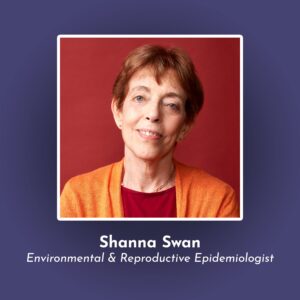
On this episode we meet with one of the world’s leading environmental and reproductive epidemiologists, Dr. Shanna Swan.
Dr. Swan discusses how chemicals in our environment threaten human hormones, male sperm count, and ultimately, human reproduction. How do endocrine-disrupting hormones disrupt pregnancy? Further, she explains “The 1% Effect,” which accounts for the 1 percent annual decrease in human fertility and related functions.
To combat the urgent threats facing human reproduction, Dr. Swan offers recommendations about how we can avoid harmful chemicals — and live healthier lives.
About Shanna Swan
Shanna H. Swan, Ph.D., is one of the world’s leading environmental and reproductive epidemiologists. She is Professor of Environmental Medicine and Public Health at the Icahn School of Medicine at Mount Sinai in New York City where is also a member of the Transdisciplinary Center on Early Environmental Exposures and the Mindich Child Health and Development Institute.
In French, we have a motto that says that a simple drawing is often better than a long explanation. Jean-Marc Jancovici Carbone 4 President
That’s very understandable because with left atmosphere thinking, one of the problems is that you see everything as a series of problems that must have solutions. Iain McGilchrist Neuroscientist and Philosopher
We can’t have hundreds and hundreds of real relationships that are healthy because that requires time and effort and full attention and awareness of being in real relationship and conversation with the other human. Nate Hagens Director of ISEOF
This is the crux of the whole problem. Individual parts of nature are more valuable than the biocomplexity of nature. Thomas Crowther Founder Restor
Show Notes & Links to Learn More
Download transcript00:50 – Shanna Swan website, Countdown: How Our Modern World Is Threatening Sperm Counts, Altering Male and Female Reproductive Development, and Imperiling the Future of the Human Race
03:17 – Endocrine disruptors – what are they, what are effects
04:55 – Study showing 47 million/milliliter sperm count in US and 50% decline over last 50 years
07:54 – Number of babies being born per woman dropped by 50%
09:07 – Insect biomass declining by one percent per year = gone in whatever time frame
09:55 – Endocrine system
11:30 – In-utero disruption vs adult disruption
12:38 – Cumulative generational exposure
13:46 – Smoking known to be cancerous in 1964
14:40 – Discomfort with talk about reproductive function
14:45 – Reproduction doesn’t have an NIH center
16:00 – The Graduate line
16:17 – FDA and EPA study of toxic impacts from chemicals, studying high vs low doses
18:25 – Amenorrhea
19:30 – Phthalates individual vs collective effects
20:57 – Phthalates affect size of genitals
22:38 – What are phthalates in?
22:56 – Toxic chemicals in Mariana Trench
23:12 – Endocrine disruptors on arctic ice
23:16 – Ant colonies in the amazon have phthalate exposure
24:08 – 22 new species are extinct
24:17 – FWS criteria for endangerment/list
24:39 – Drivers for endangerment
24:49 – Shrinking penis sizes of alligators in Lake Apopka
25:35 – Tyrone Hayes, Atrazine
26:45 – Endocrine disruptors and domesticated species
27:46 – How plastic is made, convenience
28:02 – How a barrel of oil is used, all of the areas of demand
29:07 – How to make plastic out of other sources
30:45 – Processing of food chemical introduction (eastern Europe cow milk study)
32:05 – Million marker endocrine disruptor testing
33:20 – Half life of phthalate 4-6 hours
33:32 – Cleanup reproductive health in 3 generations
35:17 – Denmark infertility program
35:40 – Do it for Denmark Campaign
35:50 – Economic systems require babies
36:48 – 2.1 replacement reproductive level
36:55 – Most developed countries below replacement rate of 2
37:52 – Children of Men
38:18 – Assisted reproduction
38:27 – Israel’s program for assisted reproduction
40:07 – Half of men on the East coast have Ghengis Khan’s Y chromosome







